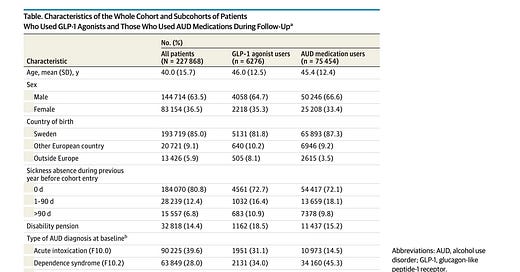GLP-1s May Work Better In Alcohol Use Disorder than Approved Treatments
A large cohort study adds to the evidence for Semeglutide and Liguritide in AUD
The Frontier Psychiatrists has been on the beat of large effect size treatments for neuropsychiatric indications from it’s inception. We have written about the potential for GLP-1 medicines (Brand names Ozempic, Monjauro, Wegovy, Zepbound, etc.) to reduce, among other things, my personal problems of diabetes and obesity and, maybe, help with addiction. Now, another very large-scale study demonstrates a hopeful finding, published in JAMA Psychiatry:
This paper uses a cohort study design. To remind my readers, a cohort study is an observational study where, either prospectively or retrospectively, a group of individuals with an exposure is identified, and researchers follow to see what happens. These tend to be much larger scale than randomized control trials and don't allow for the attribution of causality but do allow inferences about causal relationships.
In the case of the above trial, the exposure was the use of a GLP-1 medication in a population of 227,866 individuals with a pre-existing diagnosis of alcohol use disorder. The author is compared to individuals who had been exposed to a GLP-1 drug (semaglutide of liraglutide) and those who had not.
This was done in Sweden, where this kind of large-scale data exists in national registries from January 2006 to December 2023. Since this is The Frontier Psychiatrists, which might as well be “The Table One Times,” we will take a moment with that table:
We've got three groups—all and those treated with GLP-1s and those treated with standard-of-care medications for Alcohol Use Disorder (AUD)! Since this is not a randomized control trial, we're not looking to see if randomization was successful with one. In this paper, they compared all patients, those who use GLP-1s, and additionally, those who use medication for the treatment of alcohol use disorder. Remember, everyone had an alcohol use disorder in the cohort!
The primary endpoint they chose was “hospitalization, alcohol-related.” We call this sort of endpoint, a thing that either did or didn't happen, a hard endpoint. It's categorical: hospitalization or no hospitalization. There's no rating scale here; there's no “percentage improvement in something subjective”— there is an objective reality.
One thing that you'll notice is that a lot of people with alcohol use disorder have real problems—About 10% had suicide attempts, about 15% were on disability, and cardiovascular disease, kidney disease, and obesity were all common. Alcohol use disorder comes with other challenging problems for your health, and the amount of suffering depicted in that one table when you step back from it for a second and think about the actual humans involved? It's something we shouldn't turn away from or take anything less than seriously.
The authors found that GLP-1s (only semaglutide and liraglutide) reduce the risk of hospitalization.





